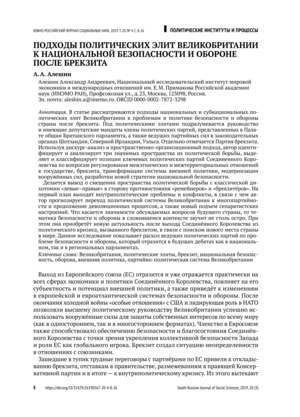Abstract
The article discusses the approaches of the UK national and sub-national political elites of the UK to the problems and policies of national security and defense after Brexit. Political elites imply leaders and members of political parties with deputy mandates, represented in the House of Commons of British Parliament, as well as leaders and members of parties in the legislatures of Scotland, Northern Ireland and Wales. In addition, the Brexit Party is emphasized separately. Using discourse analysis and a spatial organizational approach, the author identifies and analyzes three significant spaces of their political struggle, as well as identifies and classifies the positions of key political parties in the UK on regulation of interethnic and inter-territorial relations in the state, on Brexit, transformation of the foreign policy system and defence modernization, and on developing a new national security strategy. It is concluded that the space of the political struggle is shifting from the classical “left-right” dichotomy towards the confrontation between the “remainers” and “brexiters”. Domestic political problems and conflicts come to the fore, in connection with which the author predicts the transition of the political system of the UK to a multi-party system and the continuation of devolutionary processes, as well as a new rise in separatist sentiments. The topics of security and defense in the current context do not sound so acute. At the same time, they will gain new relevance after the country’s exit from the political crisis caused by Brexit, in connection with the search for a new place for the UK in the world. This study shows a split in leading political parties on the issue of security and defence, which will be reflected in future debates in both national and regional parliaments.
Keywords
References
- Ananyeva, E. V. (2019). Britaniya: raskol v vedushchih partiyah na fone brekzita [Britain: Split in Leading Parties against Brexit]. Nauchno-analiticheskiy vestnik Instituta Yevropy RAN [Scientific and Analytical Herald of the Institute of Europe RAS], 1(7), 17–23.
- Andreeva, T. N. (2019). Pravoradikal’nyye populistskiye partii Velikobritanii i uspekh na linii brekzit [The UK Right-Wing Populist Parties and the Success of Brexit Referendum Campaign]. Mirovaya ekonomika i mezhdunarodnye otnosheniya [World Economy and International Relations], 3(63), 21–29. DOI: 10.20542/0131-2227-2019-63-3-21-29.
- Ashin, G. K. (2010). Elitologiya. Istoriya, teoriya, sovremennost [Elitology. History, Theory, Modernity]. M.: MGIMO-Universitet.
- Berezkina, O. S. (2017). Ponyatiye elity kak instrument analiza politicheskikh rezhimov [The Concept of Elite as an Instrument of the Analysis of Political Regimes]. Vestnik Moskovskogo Universiteta, Seriya 8, Istoriya [Bulletin of Moscow University. Series 8. History], 2, 75–92.
- Gaman-Golutvina, O. V. (2016). Politicheskiye elity kak ob’’yekt issledovaniy v otechestvennoy politicheskoy nauke [Political Elites as an Object of Research in Russian Political Science]. Politicheskaya nauka [Political Science], 2, 38–73.
- Kapitonova, N. K. (2016). Otnosheniya Velikobritanii s partnyorami v svete referenduma o chlenstve v ES [UK Relations with Partners in the Light of EU Membership Referendum]. In Ye. V. Anan’yeva (Ed.) Referendum o chlenstve Britanii v Yevrosoyuze: khod, itogi i posledstviya. Ch. 2 [The UK EU Membership Referendum. Campaign, Results and Implications. Part. 2] (pp. 7–15). M.: In-t Yevropy RAN.
- Prokhorenko, I. L. (2015). Prostranstvennyy podhod v issledovanii mezhdunarodnyh otnosheniy [Spatial Approach in the Study of International Relations]. M.: IMEMO RAN.
- Prokhorenko, I. L. (2014). Subnatsional’nyye elity kak sub’’yekty transformatsii politicheskogo prostranstva Yevropeyskogo soyuza [Subnational Elite as Transformation Agents of the European Union Political Space]. Politicheskaya nauka [Political Science], 2, 108–126.
- Semenenko, I. S., Prokhorenko, I. L. (2015). Ot proyekta elit k massovoy politike: vyzovy politizatsii yevropeyskoy integratsii [From Elitist Project to Mass Politics: Challenges of Politicization to European Integration]. Mirovaya ekonomika i mezhdunarodnye otnosheniya [World Economy and International Relations], 7, 29–40.
- Susloparova, E. A. (2017). Predvybornyy manifest leyboristov: vozvrashcheniye k istokam ili vykhod na novyye rubezhi? [Labor Election Manifesto: Returning to Origins or Entering New Frontiers?] In Pravitelstvo T. Mei — god u vlasti, Doklady Instituta Evropy [Government T. May — Year in Power. Institute of Europe Reports] (pp. 29–34). M.: IE RAN.
- About Emily Thornberry. Emily Thornberry MP. Retrieved from https://www.emilythornberry.com/about/
- Agreement on the Withdrawal of the United Kingdom of Great Britain and Northern Ireland from the European Union and the European Atomic Energy Community, as Endorsed by Leaders at a Special meeting of the European Council on 25 November 2018. (2018, November 25). Gov.uk. Retrieved from https://assets.publishing.service.gov.uk/government/uploads/system/uploads/attachment_data/file/759019/25_November_Agreement_on_the_withdrawal_of_the_United_Kingdom_of_Great_Britain_and_Northern_Ireland_from_the_European_Union_and_the_European_Atomic_Energy_Community.pdf.
- Britain at the Heart of a Changing World Policy Paper 132 (2018). Liberal Democrats. Retrieved from https://d3n8a8pro7vhmx.cloudfront.net/libdems/pages/43501/attachments/original/1533290055/Policy_Paper_132_-_Britain’s_Place_in_the_World.pdf?1533290055
- Confidence and Supply Agreement between the Conservative and Unionist Party and the Democratic Unionist Party (2019, March 22). Gov.uk. Retrieved from https://www.gov.uk/government/publications/conservative-and-dup-agreement-and-uk-government-financial-support-for-northern-ireland/agreement-between-the-conservative-and-unionist-party-and-the-democratic-unionist-party-on-support-for-the-government-in-parliament.
- Duke, S. (2019). Will Brexit Damage our Security and Defence? Palgrave Macmillan.
- European Election Manifesto 2019. (2019). DUP. Retrieved from http://www.mydup.com/images/uploads/publications/European_manifesto_-_Final.pdf
- For the Many, not the Few. The Labour Party Manifesto 2017. (2017). Labour Party. Retrieved from https://labour.org.uk/wp-content/uploads/2017/10/labour-manifesto-2017.pdf
- Global Britain. Sixth Report of Session 2017–19. (2018, March 12). House of Commons, Foreign Affairs Committee. Retrieved from https://publications.parliament.uk/pa/cm201719/cmselect/cmfaff/780/780.pdf.
- Griffith, N. (2017, October 26). Ensuring the UK Armed Forces are Properly Equipped to Confront any Threat to British National Security. Nia Griffith MP. Retrieved from https://niagriffith.org.uk/2017/10/ensuring-the-uk-armed-forces-are-properly-equipped-to-confront-any-threat-to-british/
- Memorandum from the Foreign and Commonwealth Office (2018, March 12). House of Commons. Retrieved from https://publications.parliament.uk/pa/cm201719/cmselect/cmfaff/780/78008.htm#_idTextAnchor035
- National Security Strategy and Strategic Defence and Security Review 2015 (2015, November). HM Government. Retrieved from https://assets.publishing.service.gov.uk/government/uploads/system/uploads/attachment_data/file/478933/52309_Cm_9161_NSS_SD_Review_web_only.pdf
- National Security Capability Review (2018). Cabinet Office. Retrieved from https://assets.publishing.service.gov.uk/government/uploads/system/uploads/attachment_data/file/705347/6.4391_CO_National-Security-Review_web.pdf
- Our Political Programme. Green Party. Retrieved from https://www.greenparty.org.uk/assets/images/national-site/political-programme-web-v1.3.pdf
- Scotland’s for Europe (2019). SNP. Retrieved from https://s3-eu-west-2.amazonaws.com/www.snp.org/uploads/2019/05/05_11e-SNP-Euro-Elections-manifesto_web-download.pdf
- SIPRI Fact Sheet May 2018 (2018). Retrieved from https://www.sipri.org/sites/default/files/2018–04/sipri_fs_1805_milex_2017.pdf
- Standing Strong for Northern Ireland. (2017). DUP. Retrieved from http://www.mydup.com/images/uploads/publications/DUP_Wminster_Manifesto_2017_v5.pdf
- Stronger for Scotland (2019). SNP. Retrieved from https://d3n8a8pro7vhmx.cloudfront.net/thesnp/pages/9544/attachments/original/1496320559/Manifesto_06_01_17.pdf?1496320559
- The Future Relationship between the United Kingdom and the European Union (2018, July). HM Government. Retrieved from https://assets.publishing.service.gov.uk/government/uploads/system/uploads/attachment_data/file/786626/The_Future_Relationship_between_the_United_Kingdom_and_the_European_Union_120319.pdf
- UK Defence in Numbers 2018 (2018). Retrieved from https://assets.publishing.service.gov.uk/government/uploads/system/uploads/attachment_data/file/754740/20181107_CH_Defence_in_Numbers_2018_Final_Revised.pdf
 Русский
Русский


